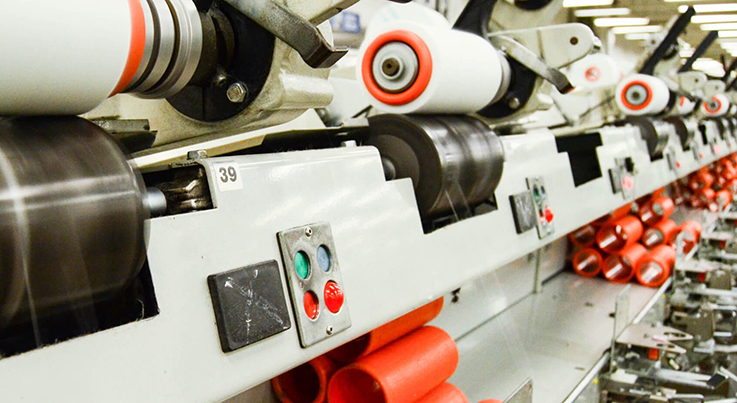Joining the United Nations Global Compact, a worldwide initiative with 10 sustainability principles.
The construction of a wastewater treatment facility in Mexico that will save 140 million gallons of water per year.
Addressing climate change and setting a goal to reach net-zero emissions by 2050.
The announcements are just a few of the many initiatives Elevate Textiles has delivered or promised in its mission to provide environmentally friendly products to socially conscious consumers. From how cotton is cultivated to water usage to responsible manufacturing, executives at the company, which is based in North Carolina, believe sustainable practices make good business sense.
“We’re trying to stay in step and maybe even anticipate where our customers are going so that they see us and trust us,” Elevate chief sustainability officer Jimmy Summers said. “Really, it’s about trust. It’s not as much about the price and trying to get the lowest price for fabric or for threads, although certainly our customers don’t want to overpay. But they also trust that when they buy from us, they know that things have been done ethically and sustainably.”
Platinum Equity acquired International Textile Group in 2016, later adding American & Efird to rebrand the combined businesses as Elevate Textiles in 2019. Elevate is the parent company of American & Efird, Burlington, Cone Denim, Gütermann and Safety Components. The company manufactures a wide range of fabrics and threads across many industries, which include fashion, work apparel and footwear.
Probably the most familiar products are blue jeans, which are manufactured with denim fabric produced by Cone Denim mills. Levi Strauss, Wrangler, J. Crew and other familiar brands are among Cone Denim clients.
Growth and sustainability were always part of Platinum’s operations plan, and the firm – along with the management team – analyzed investments that made the most sense.
That has led to sustainability funding.
“Platinum has been very supportive – and I’m not saying this because they’re my boss,” Cone Denim president Steve Maggard said. “They have been truly supportive of approving projects that are enabling us to get to and remain at the forefront of innovation in the denim world.”
Offering sustainable solutions
For the consumer, price and comfort are main factors when it comes to shopping for blue jeans. But industry leaders note a new concern growing over the last decade.
Consumers want to know sustainability practices. Simply put, owning a pair of jeans can consume a lot of water.
In 2009, Levi Strauss estimated that a pair of blue jeans consumes 919 gallons of water during its life cycle when you consider the process of growing cotton, washing it, dyeing it blue and consumer washing habits.
“There wasn’t a major focus on water reduction or energy efficiency or things of that nature years ago,” Maggard said. “It was more you were trying to save money. If you were trying to save water, it was trying to reduce cost. It really wasn’t to tell a sustainable story.
“But that’s really changed. More customers are asking about sustainability. Right now, I would say that 90% of our new developments have a sustainable aspect of some type, whether it be water reduction, sustainable fibers, sustainable dyes, or a sustainable manufacturing process.”
The awareness forces companies to seek partners who offer sustainable solutions.
Take J. Crew’s Madewell jeans brand, which was created more than a decade ago to target younger consumers, according to J. Crew Group senior vice president and head of sustainability Liz Hershfield.
Last fall, Cone announced the self-clean jean, which is designed to promote fewer washing machine cycles. The fabric is chemically designed to kill odor-causing bacteria,
“There’s a lot of emphasis right now on water savings,” Maggard said. “You don’t really need to wash your clothing as often as we do, especially in the U.S. What we’re trying to do is for those people who are very water conscious, we want to offer them a garment that’s not going to start smelling due to body odor or perspiration.”
It’s that kind of innovation that supports brands like Madewell.
“It’s important that we work with suppliers and mills that offer sustainable fibers which (Elevate) does,” Hershfield said. “I think just across the board, the focus on the environment is really in alignment with our goals.”
Profound shift
Several persons interviewed for this story mentioned a catastrophe in Bangladesh on April 23, 2013.
The Dhaka garment factory collapse killed more than 1,000 and injured more than 2,000. Many well-known brands were manufactured at the factory, and much of the outcry was focused on unsafe working conditions, according to Tricia Carey, director of global business development for the Lenzing Group, a fiber manufacturer that’s an Elevate vendor.
“The companies that were producing in Bangladesh, they couldn’t run away because that’s not responsible,” Carey said. “You can’t be a part of creating this problem and then run away from it.
The tragedy speaks to the social responsibility of industry. Then, there is the consideration of waste, a byproduct of the era of fast fashion. The industry also must consider a large carbon footprint.
That is why Elevate takes a thoughtful approach to the entire life cycle of its products, which includes how cotton is grown.
“We do not actually grow or gin any cotton ourselves,” Maggard said. “But what we do is we assure that the people we’re doing business with are operating in a responsible, environmentally friendly and sustainable way.”
One example is Cone using Lenzing Group technology to recycle cotton apparel.
Elevate also has an innovation hub that seeks sustainable solutions.
“In the future, we’re probably going to be talking about waterless dyeing or foam dyeing, which uses bubbles or air to carry dyes instead of water,” Maggard said.
Just one of the many areas of innovation and sustainability that Platinum supports.
“Those are investments that Platinum has approved and they’ve been very supportive on our efforts,” Maggard said.



